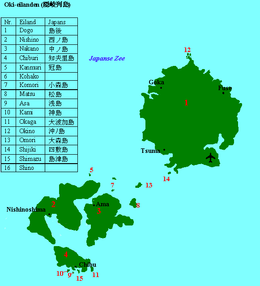Dōgojima
| Native name: 島後 Dōgo | |
|---|---|

Coastline of Dōgo
|
|
| Geography | |
| Location | Sea of Japan |
| Coordinates | 36°14′N 133°17′E / 36.233°N 133.283°ECoordinates: 36°14′N 133°17′E / 36.233°N 133.283°E |
| Archipelago | Oki Islands |
| Area | 241.58 km2 (93.27 sq mi) |
| Coastline | 211 km (131.1 mi) |
| Highest elevation | 607.7 m (1,993.8 ft) |
| Highest point | Mount Daimanji |
| Administration | |
|
Japan
|
|
| Prefectures | Shimane Prefecture |
| District | Oki District |
| Town | Okinoshima |
| Demographics | |
| Population | 14,849 (2013) |
| Ethnic groups | Japanese |
Dōgo (島後?) is one of the Oki Islands in the Sea of Japan.
The island, 241.58 km² in area, has a population of approximately 14,849 persons. The island is administered by the town of Okinoshima in Shimane Prefecture. Much of the island is within the borders of Daisen-Oki National Park.
Dōgo is the largest of the Oki Islands. It is located approximately 80 kilometres (43 nmi) north of Honshu coast. The island is of volcanic origin, and is roughly circular, with an approximate diameter of 20 kilometres (12 mi), with its highest point at the summit of Mount Daimanji at 608 metres (1,995 ft) above sea level.
The climate of Dōgo is classified as a humid subtropical climate (Köppen climate classification Cfa) with very warm summers and cool winters. Precipitation is abundant throughout the year.
The Oki Islands have been inhabited since the Japanese Paleolithic era, and numerous artifacts from the Jomon, Yayoi and Kofun periods have been found by archaeologists. The island of Dōgo is mentioned in the Nara period chronicles Kojiki and Nihon Shoki, and Dōgo was the location of the capital of ancient Oki Province.
Dōgo was used as a place of exile from the Nara period, but is well known as the place of exile for ex-Emperor Go-Toba, who died on Nakanoshima in 1239, and for Emperor Go-Daigo, who was exiled to Nishinoshima from 1331-1333 The island became tenryo territory directly under the control of the Tokugawa shogunate in the Edo period.
...
Wikipedia

